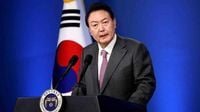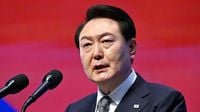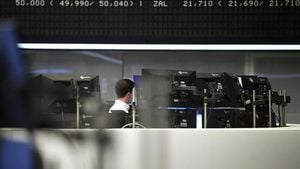The Constitutional Court in South Korea announced on Tuesday, April 1, 2025, that it will issue a ruling next Friday, April 4, 2025, regarding the impeachment of President Yoon Suk-yeol. This decision comes amid a political crisis that has engulfed the nation since Yoon's controversial attempt to impose martial law in December 2024. The court's ruling will determine whether Yoon will remain in office or face a new presidential election within 60 days.
The court is currently reviewing a political dispute stemming from Yoon's veto of a law regarding customary legal practices, which has been a focal point of contention. Critics argue that this veto was an attempt to undermine democratic processes, as it delayed parliamentary oversight of state finances. The parliament voted to impeach Yoon on December 14, 2024, following his declaration of martial law on December 3, which was seen as an attempt to stifle opposition and maintain control over the legislative process.
In a statement, the court confirmed, "The ruling in the case of the president's impeachment will be issued on April 4." The implications of this ruling are significant; if the impeachment is upheld, South Korea will have to conduct new elections within 60 days, fundamentally altering the political landscape. Conversely, if the court rejects the impeachment, Yoon will be reinstated in his position, allowing him to continue his presidency amidst ongoing legal challenges.
Yoon, a former prosecutor, has faced severe backlash since his martial law declaration, which included sending troops to the parliament to prevent lawmakers from overturning his veto. This act was perceived as a direct assault on democratic norms, leading to accusations of rebellion against the state. The political turmoil intensified when Yoon was arrested on January 15, 2025, following a warrant issued by the judiciary. However, he was released from custody on March 8 after a court ruling quashed the arrest warrant against him.
Police have announced that they will deploy personnel to maintain order during the court proceedings, emphasizing their commitment to preventing any disruptions that could arise from the ruling. The atmosphere surrounding the court's decision is charged, with many citizens and political analysts closely monitoring the situation.
This political crisis has sparked widespread debate about the future of democracy in South Korea. Many citizens express concern that Yoon's actions could set a dangerous precedent for future leaders. The implications of the court's ruling extend beyond Yoon's presidency; they could redefine the relationship between the executive branch and the legislative assembly in South Korea.
As the nation awaits the court's decision, public sentiment remains divided. Supporters of Yoon argue that his actions were necessary to maintain stability in a turbulent political environment, while opponents view his attempts to impose martial law as a blatant disregard for democratic principles. The political landscape in South Korea is at a crossroads, and the upcoming ruling will undoubtedly shape its trajectory.
In summary, the Constitutional Court's ruling on April 4 will not only determine the fate of President Yoon Suk-yeol but also reflect the broader struggles within South Korea's democratic framework. As citizens brace themselves for the potential outcomes, the stakes remain high in a nation grappling with the balance between authority and individual rights.





